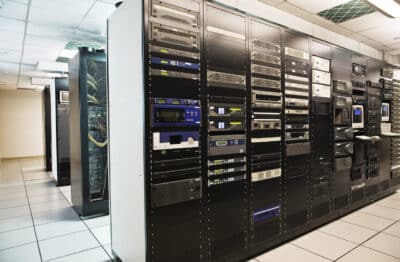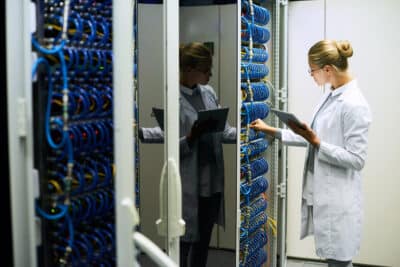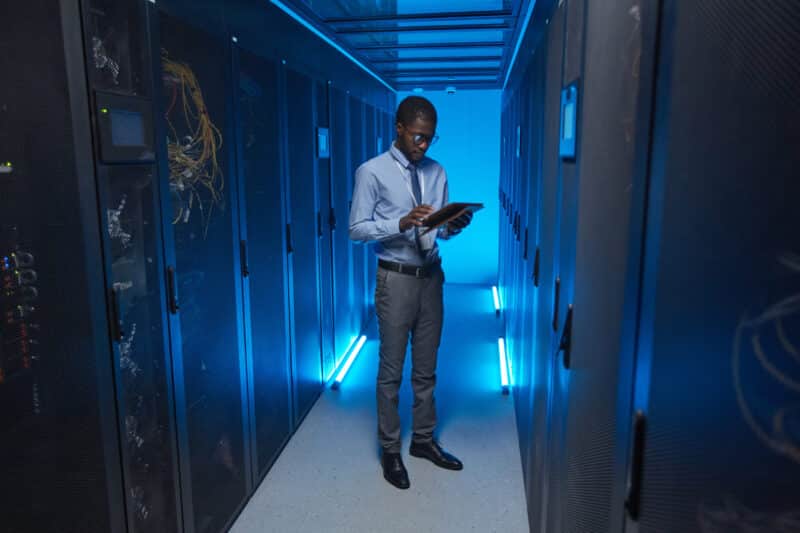Businesses of all sizes rely on computer systems, IT infrastructure, and other physical assets to function on a daily basis. However, housing and protecting this important equipment can be an expensive undertaking. It’s generally cost-prohibitive to own and maintain an in-house data center for your servers and data storage (except for enterprise customers from the world’s largest corporations). On the other hand, while cloud services are attractive price-wise, they don’t offer ultimate control over a company’s assets.
This is where colocation data centers provide a perfect hybrid solution.
Understanding Colocation Data Center Facilities
Colocation data center facilities (or colo facilities) effectively enable businesses to access their computing hardware, IT infrastructure, and other equipment without incurring the perpetual data center costs. Instead, the colocation data center is responsible for the facilities that colocation tenants utilize. Additionally, they maintain all backbone elements, such as power cooling systems and physical security, and ensure uninterruptible power supplies for all data center tenants.
A colocation facility or colo facility is an excellent option for businesses of all sizes to rent space for their own hardware and infrastructure without investing in physical offices or facilities. However, there is a lot more to colocation data centers than simply renting space, and not all colocation providers are created equal.
Read on to uncover the details behind colocation data centers. This will help you determine whether your business would benefit from enlisting the expert managed services provided by a top-rated colocation data center facility provided by DartPoints.
Table of Contents
How Can Data Center Space Be Rented?
Types of Colocation Facilities
What is the Difference Between a Colocation Data Center and the Cloud?
The Primary Features of Data Colocation Center
The Top Benefits of Colocation Data Center Providers
Top Considerations When it Comes to Colocation Data Center Providers
Partner with DartPoints for Premier Colocation Data Center Solutions
What is a colocation data center?
A modern data center colocation service goes far beyond simply offering rack space… it’s a cornerstone of the global data and services industry.
Whether you’re an enterprise seeking a dedicated data center or an IT service provider looking to scale, partnering with a reliable data center colocation provider enables access to critical infrastructure, high density power, and secure facility environments.
Today’s top colocation companies, such as DartPoints, lead the way in offering robust interconnection services, renewable energy usage, and advanced surveillance systems to support the evolving needs of the data center business.
These colocation solutions are ideal for organizations that require physical security measures, network monitoring, controlled access, and specialized installation services across strategic markets. From colocation cabinets to high-density colo data centers, colocation providers offer a wide range of datacenter services that integrate seamlessly with cloud computing platforms like Google Cloud.
With support services tailored to ensure uptime and compliance, colo providers empower businesses to maintain optimal data center operations while connecting with leading network providers, all within a secure, efficient, and sustainable colocation data centre. As demand grows, these data centre services remain critical for server colocation, hybrid cloud architectures, and resilient operating system deployment at scale.
In its simplest terms, a colocation facility is a data center or a telecommunications facility where an individual business can rent data center space for their servers, storage devices, and other computing and networking hardware.
The colocation provider handles the data center facilities and attributes. This includes the building, power cooling systems, networking equipment, network connectivity, and data center security. The customer or business, in turn, supplies their own servers, storage devices, and other equipment. Essentially, a colocation data center can support all a business’ existing IT infrastructure, despite the company’s size or exact (and evolving) needs.

How can data center space be rented?
Leasing space within a data center can vary, and when it comes to the top colocation providers and colocation facilities, colocation space can cater to a company’s distinctive requirements.
For example, data center options include rack space, cabinet or cage space, or even private suites (depending on the colocation provider.)
Several data centers have expanded their offerings to include managed colocation services supporting customers’ additional needs. These services include internet access, network connectivity and services, managed security services, and disaster recovery assistance.
Every colocation facility varies in terms of services offered. Therefore, it’s important to conduct in-depth research on data center service providers to ensure that the colocation facility aligns with your data center needs.

Types of colocation facilities
A data center colocation facility is generally classified as one of the following three types of data centers.
- Retail colocation – In retail data center colocation, the customer rents a section of space within the colocation facility (usually rack space in a caged-off and designated area).
- Wholesale colocation – In wholesale colocation, a business rents its own fully built and on-premises data center space, typically at a lower cost than a single retail customer. This option is best suited for large companies with significant power and space requirements, such as internet service providers, cloud service providers, and companies with hundreds or even thousands of servers.
- Hybrid cloud colocation – Hybrid cloud colocation is a relatively new option that is gaining steam and popularity. Hybrid cloud colocation entails a combination of in-house data center space and additional space that is rented from another data center or storage provider.
What is the difference between a colocation data center and the cloud?
Colocation data center service providers and cloud providers are two terms that are sometimes interchangeably tossed around, but the two concepts have very different details.
In both instances, a business’s IT assets are housed at an off-site location by a third-party provider, but the two data center deployment models have key distinctions.
In the cloud model, the underlying physical assets are owned and managed by the cloud provider. The business has access to all virtual assets through multiple network connections. However, the physical infrastructure is typically controlled by the cloud provider alone. This can vary, however, based on the cloud service model.
For example, companies have much more control in a private cloud model, which is created and designated for a single organization’s IT infrastructure. In a public cloud model, shared with thousands and even millions of other customers, a business’s control over the physical and IT infrastructure is severely limited.
In the colocation data center model, a business controls and owns their own data center assets, such as computers, servers, network hardware, and other equipment. Meanwhile, the data center provides the physical infrastructure and facilities required to ensure this equipment is safely stored and maintained (like cooling systems and physical security.)

The primary features of a data colocation center
The exact attributes and features of a colocation facility can vary from data center to data center but are generally more advanced and secure than owning and operating an in-house data center.
These features can include the following:
- A physical building that is designed for data center storage.
- Physical security, such as video surveillance, biometric scanners, and trained data center staff.
- Dedicated cooling systems, such as air conditioning, heating, and ventilation sources.
- Redundant power sources, including (but not limited to), backup power generators, battery backup systems, and more.
- Redundant internet connections through multiple network carriers or other measures.
- Compliance with various regulations for data center security and data center facilities.
- On-site technical support and experienced professionals to answer questions.

The top benefits of colocation data center providers
There are a wide range of advantages when it comes to colocation data centers, and a handful of these benefits include the following.
Reliability
Maintaining an in-house server, hardware, and infrastructure site is an evolving and perpetual challenge. From physical security to ensuring constant power consumption, it’s virtually impossible for a single business to manage a complete data center on their own, without interruptions in service.
However, a colocation data center provides all the assets required to ensure uninterrupted power usage and service, such as reliable power systems, cooling systems, and communications, which all guarantee dependable conditions. As a result, colocation vendors provide uninterrupted peace of mind and allow businesses to avoid catastrophic issues due to downtime.
Performance
The cooling systems and air filtering systems that a colocation data center provides are usually cleaner and more pristine than any physical office. In addition, they ensure that all electronics and equipment within the data center can perform their best.
Physical security
Physical security is a huge asset when it comes to a colocation data center. In addition, its data center security procedures are often miles more extensive than any in-house security measures. Examples of these higher degrees of physical security protections include video surveillance, protection of the geographic location, and fire suppression systems.
The maintenance of systems
Data centers have specialized systems to ensure that servers and other equipment are protected and operating at peak efficiency. This gives companies peace of mind, knowing that all their equipment is being taken care of by experienced professionals.
Scalability
One of the most noticeable assets of colocation data center facilities is the freedom they give businesses to grow. With a colocation data center, a company can scale its business needs and equipment up or down as needed while only paying for the space that it requires.
Expanded capabilities
In addition, customers within a colocation data center facilities have the continual option to increase their bandwidth as needed, without having to make extra investments. So, customers can seamlessly adjust how much bandwidth they need without extra effort as they add new applications and systems.
Speed
Colocation data center facilities offer affordable and direct connections to numerous internet service providers. This means ample and corresponding avenues when it comes to a need for speed.
Exceptional personnel
In order for a colocation data center to function, a highly specialized team of data center staff is required. This is why colocation data center facilities employ highly trained and experienced IT personnel to design and implement reliable and technologically advanced infrastructure and provide customer support.
Better risk management
Natural disasters, data breaches, and other crises can certainly happen no matter where you are. However, when your most important IT infrastructure is housed in an off-site data center, there are multiple safeguards in place. Some of these include backup generators, to keep your business’s ability to function as protected as possible.
Better and more reliable connectivity
A colocation data center facility has redundant network connections that ensure the continuous operation of your mission-critical applications, combined with other attributes to eliminate downtime in operations.
Better network security
Data centers use the most reliable and technologically advanced firewalls to pinpoint and stop any illegal access to your systems before becoming an expensive crisis. By utilizing colocation in data center facilities, you automatically benefit from the top-tier levels of cloud security that these data centers establish for all their customers.
Redundant power supply
Colocation data center facilities ensure that they have uninterrupted power by relying on a combination of several power grids, backup generators and battery backup systems, and rigorous maintenance procedures.
Flexibility
The managed services you require from a colocation data center will likely evolve, and that’s perfectly fine. With a colocation data center, you can expand or scale back on space, bandwidth, services, and other attributes as your business grows and changes in the future.
Top considerations when it comes to colocation data center providers
As stated, it’s essential to do your research before selecting a colocation data center for your company.
So, before choosing a colocation data center facility, be sure to keep the following considerations in mind.
Compliance
Be sure that your colocation data center satisfies any regional or legislative data management requirements for your business and industry.
Performance
Ask about the security and maintenance measures in place to ensure uninterrupted performance for all equipment within the data center.
Redundancy
Ensure your data center has redundancy on multiple fronts, including internet connections and power supplies.
Scalability
Ask your data center if you can adjust the managed services, you may require as your business expands.
Customer service
When it comes to relying on a colocation data center to house your crucial equipment, customer service is crucial! Make sure that you have a reliable and constant way to ask questions and reach a team of trained and specialized data center staff whenever required.
Security
Ask about all aspects of the colocation data center’s security procedures, from physical security to measures that protect our equipment from data breaches or other issues.
Cost
It’s also helpful to ask about cost upfront. In almost all cases (except for substantial enterprise customers from global corporations), the cost of a colocation data center is much cheaper than owning and maintaining your in-house data center. This is true in your initial investment, as well as miles into the future, as maintenance costs, power usage, and other expenses add up when it comes to in-house facilities.

Partner with DartPoints for Premier Colocation Data Center Solutions
When it comes to the best colocation data center facilities available, the conversation begins and ends with DartPoints.
Our state-of-the-art infrastructure and dedicated support team assistance are unmatched, and we ensure secure and high-performance operations for your business, 24/7.
Best of all, our multi-tenant, shared-cost colocation model lowers costs across the board while allowing you the freedom to customize the space you need for your data now and well into the future.
As for security, our procedures are second to none, including biometric access controls, constant surveillance, and rigorous entry protocols to protect sensitive data.
Reach out to our team today to discuss your data storage needs and how we can help. With DartPoints, you have a solution to ensure your business can run as fast and efficiently as possible while having ample freedom to grow.
